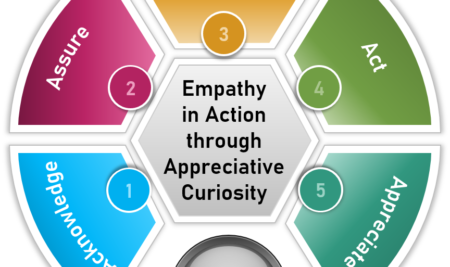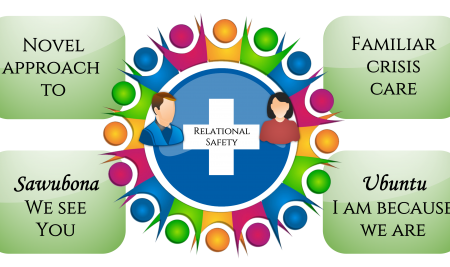
The Evidence Base Behind PROTECT
“Think of this as buying new clothes for an old wardrobe.”
When engaging with the PROTECT training — whether through our workshops, resources, or this website — we invite you to take a layered approach to learning. Imagine you’re not starting from scratch, but updating your existing wardrobe. You don’t need to throw out what you already own. You might simply find a new shirt that pairs well with your favourite trousers — a new perspective that complements the experience, frameworks, and tools you’ve already gathered.
PROTECT isn’t a proprietary technique. It’s a synthesis. It draws together well-established, evidence-informed approaches that have long guided best practice in mental health and suicide prevention. These include:
- Relational safety and person-centred care, grounded in Rogerian traditions and recovery-oriented practice
- Cognitive Behaviour Therapy (CBT) and Dialectical Behaviour Therapy (DBT)
- Acceptance and Commitment Therapy (ACT)
- Interpersonal Therapy (IPT)
- Solution-Focused Brief Therapy (SFBT)
- Safety planning and clinical risk formulation, as taught across psychiatric, psychological, and nursing disciplines
PROTECT weaves these threads into a practical, values-anchored framework that guides both organisational implementation and everyday clinical interaction. While the form may be new, the fibres are familiar to anyone who has worked in the field of mental health.
📘 Learning Across Experience Levels
Whether you’re a novice clinician seeking a structured approach to suicide prevention, or an experienced practitioner looking to refresh, integrate, or extend your skills — there is something here for you.
For newer practitioners, the PROTECT framework can offer:
- A grounded, values-based starting point for clinical conversations
- A clear model for navigating risk in complex presentations
- Tools for integrating therapeutic micro-skills with system-level responses
For seasoned professionals, PROTECT may serve as:
- A reminder of foundational principles, reinterpreted through a relational lens
- A bridge between therapeutic intent and documentation
- A shared language for supervision, team training, and quality improvement
Further Reading: Expanding Your Toolkit
Engaging with PROTECT is akin to updating your wardrobe — integrating new pieces that complement your existing attire. Similarly, the following books are designed to enrich your professional practice, offering fresh perspectives and tools that align with the PROTECT framework.
Suicide Prevention & Clinical Practice
- PROTECT: Suicide Prevention by PROactive deTECTion
An in-depth exploration of the PROTECT framework, focusing on proactive detection and intervention strategies in suicide prevention. - PROTECT Workbook: PROactive deTECTion for Suicide Prevention
A practical companion to the PROTECT guide, featuring exercises and case studies to apply the framework effectively. - PROTECT Guidebook: Novel Solutions for Suicide Risk Assessment and Management through Relational Safety
This guidebook delves into innovative approaches for assessing and managing suicide risk, emphasizing relational safety.amazon.com - Suicide Prevention STEPS (Vol 1): A Theoretical and Practical Guide
Introduces foundational concepts and practical applications for suicide prevention strategies. - Suicide Prevention STEPS (Vol 2): Classic Models, Clear Impact
Explores timeless models in suicide prevention and their impactful applications. - Suicide Prevention STEPS (Vol 3): Contemporary Models, Simplifying Complexity
Focuses on modern approaches to suicide prevention, aiming to simplify complex scenarios.
- Healing for Healers: Journey After Losing A Patient To Suicide
Addresses the emotional journey of healthcare providers coping with patient loss due to suicide.amazon.com - The Living Oak: Connection through Courage, Curiosity, Compassion, Collaboration, Commitment
Explores the interconnectedness of personal growth and professional practice through core virtues.
- PEARLS: Suicide Prevention for Health Professionals: A concise guide tailored for healthcare providers, offering practical strategies for suicide prevention within clinical settings.
- Photographer of the Inner World: Utilizes the metaphor of photography to delve into the internal landscapes of individuals, offering a unique perspective on suicide prevention.
- Lupa’s Light for the Wildwood Within: Focuses on healing the heart of Borderline Personality Disorder, providing insights and guidance for both individuals and clinicians.
- Guiding Lights: Using the ABCs to Navigate Care Dilemmas: A manual designed for Progress Guides, offering strategies to navigate complex care situations using the ABC framework.
Values-Based Development Series
Compass Chronicles
A four-volume narrative series exploring values-based growth through metaphor, reflective dialogue, and practical application. Each book follows a thematic arc within the HOPE framework to guide self-discovery and healing.
- Compass of the Heart: The foundational text introducing the 100 values of HOPE as a navigational guide for life.
- The Compass Voyager: Begins the values journey, focusing on Acceptance, Belonging, Compassion, and other foundational threads.
- The Compass Explorer: Explores values like Freedom, Forgiveness, and Honesty through rich inner landscapes and real-world dilemmas.
- The Compass Seeker: Delves into more nuanced values such as Intuition, Joy, and Security, inviting deep reflection.
- The Compass Navigator: Concludes the journey with themes of Wonder, Wisdom, and Meaningful Action.
Each volume can be read independently or as part of a structured progression for use in coaching, therapy, or personal development.
Values Workbooks Series
Designed as hands-on companions to the Compass Chronicles, these four workbooks support structured reflection, goal-setting, and real-world application of the HOPE values framework.
- Values Voyager Workbook: Guides the reader through values from Acceptance to Effectiveness using exercises and personal prompts.
- Values Explorer Workbook: Focuses on Freedom to Honesty, encouraging practical enactment of each value.
- Values Seeker Workbook: Covers Intuition to Security, with tools for identifying, clarifying, and integrating values in daily life.
- Values Navigator Workbook: Completes the cycle with Self-Reliance to Wonder, fostering meaning-making and long-term alignment.
These workbooks are suitable for individuals, clinicians, coaches, and teams seeking to embed values more deeply into their decision-making and relationships.
Building Resilience in Schools: The Sunny’s Values Scouts Series
At Progress Guide, suicide prevention begins not just with crisis intervention — but with values education, early connection, and emotional literacy. That’s why our work extends into classrooms, libraries, and family homes, where resilience begins to take root. The Sunny’s Values Scouts series is a 20-book collection designed to help children cultivate core values and inner strengths that protect mental wellbeing and reduce vulnerability over time.
Each story follows Sunny the golden retriever and his animal friends on whimsical adventures, where they discover what it means to live with courage, connection, purpose, and empathy. With 100 values explored across the series, the books are more than stories — they’re foundations for emotional intelligence and social development.
Whether you’re a parent, teacher, school counsellor, or youth mental health professional, these books offer tools to:
- Promote protective factors through storytelling
- Strengthen emotional regulation and communication
- Encourage growth mindset, problem-solving, and belonging
- Spark conversations about values, relationships, and identity
A Practical Suicide Prevention Strategy in Educational Settings
The Sunny’s Values Scouts series complements Progress Guide’s broader efforts in school-based suicide prevention, where we advocate for:
- Upstream interventions that foster resilience before distress escalates
- Values-based curricula to build identity, connection, and hope
- Inclusive language and storytelling to reach diverse learners
By teaching children early on how to name their feelings, express needs, and live with meaning, we strengthen the very capacities that reduce risk in adolescence and beyond. These stories are not therapy — but they are therapeutic. They help children understand themselves and others, reducing stigma, shame, and silence around emotional challenges.
Sunny’s Values Scouts – Complete Catalogue
- The Path to Belonging explores the values of Belonging, Acceptance, Connection, Family, and Loyalty.
- The Courage to Explore explores the values of Courage, Adventure, Wonder, Curiosity, and Inner Strength.
- The Art of Wisdom explores the values of Wisdom, Integrity, Justice, Judgement, and Self-Control.
- The Spirit of Kindness explores the values of Kindness, Compassion, Gratitude, Sensitivity, and Vulnerability.
- The Power of Responsibility explores the values of Responsibility, Accountability, Self-Reliance, Discipline, and Respect.
- The Quest for Excellence explores the values of Excellence, Focus, Determination, Efficiency, and Professionalism.
- The Path of Growth explores the values of Growth, Adaptability, Perseverance, Maturity, and Learning.
- The Balance of Life explores the values of Balance, Patience, Simplicity, Wellbeing, and Equilibrium.
- The Power of Purpose explores the values of Purpose, Direction, Challenge, Risk-Taking, and Fulfillment.
- The Reflection of Beauty explores the values of Beauty, Health, Sustainability, Gratitude, and Self-Reflection.
- The Journey to Freedom explores the values of Freedom, Autonomy, Passion, Initiative, and Authenticity.
- The Mindful Path explores the values of Mindfulness, Order, Solitude, Calmness, and Clarity.
- The Joy of Friendship explores the values of Friendship, Support, Humour, Happiness, and Belonging.
- The Heart of Leadership explores the values of Leadership, Trust, Collaboration, Fairness, and Vision.
- The Legacy of Sincerity explores the values of Sincerity, Dignity, Inspiration, Spirituality, and Authenticity.
- The Echoes of Creativity explores the values of Creativity, Imagination, Authenticity, Endurance, and Innovation.
- The Magic of Teamwork explores the values of Teamwork, Diversity, Altruism, Cooperation, and Security.
- The Road to Achievement explores the values of Achievement, Vision, Effort, Persistence, and Humility.
- The Heart of Love explores the values of Love, Forgiveness, Vitality, Empathy, and Respect for Nature.
- The Compass of Significance explores the values of Significance, Service, Logic, Purpose, and Thoroughness.
For a comprehensive view of Dr. Kar Ray’s book publications, please visit his Amazon Author Page.
If you need further assistance or information on any specific publication, feel free to ask.
Events
Upcoming Education Events that may interest you
Latest Blog Posts
What's happening in the world of mental health
Appreciative Curiosity to Support the Mental Health Sequelae of COVID-19
Navigating Rocky Waters
The Lion Within
What is Happiness? A Journey Through Time
01 | Introduction to PROTECT: Novel Solutions to Suicide Risk Management
02 | Navigating Rocky Waters
Testimonials
What students said about courses they attended?

Intensive Simulation Training
The 7 SAFE Steps role plays initially were fairly intimidating, but as the day went this built up my confidence. Having real time feedback and learning from the demonstrations and the others in the group was invaluable. I now have a long list of things that I should do and not do.

Consultant Psychiatrist
“AWARE helped me think about my own attitudes that I hold towards people in suicidal distress and how that impacts my clinical decision making as well as the way in which I supervise my juniors.”

Clinical Nurse Specialist
“ 1-2-7 is a simple but effective tool, it will change the way in which I approach the safety planning discussion. It ha helped me think about safety in a broader way and all the resources that I can pull on to support a person in suicidal distress. Strongly recommend it to everyone.”

Psychologist
“ The speed dating session in which we practiced the pain relief conversation was a real eye opener. Just saying the same words 5 times to 5 different colleagues within 5 minutes pushed up my skill levels significantly – just feel more confident talking about a person’s psychological pain and calling it for what it is. ”

Peer Worker
“ I wanted to skip DESPAIR and wanted to jump to ASPIRE, but going through the whole course in a systematic way brought home the importance of doing a thorough assessment and gaining an understanding of risk – DESPAIR looks straight forward even for those with lived experience to think about risk while supporting someone who is feeling suicidal.”

Consultant Psychiatrist
“ Since I have been exposed to the PROTECT framework at WPA in Mexico, I can only think of it when it comes to teaching people about risk of suicide and self harm, it has been absolutely transformative for my clinical practice ”

Occupational Therapist
“ I found the educational sessions inspiring and it has rejuvenated me, striking the fine balance between risk and recovery is challenging and draining, but the care compass really makes it easy to conceptualize and talk through with a patient. ”
Subscribe now and receive newsletter with educational materials, new courses, interesting posts, popular books and much more!








